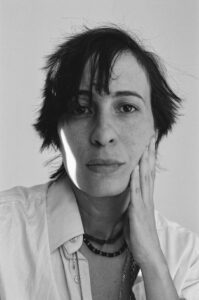Lamiae Bouqentar (she/her)

SSHRC Postdoctoral Fellow
Email: lamiae.bouqentar@utoronto.ca
Areas of Interest
- Queer Diaspora
- Affect theory
- Auto-theory
- Auto-fiction
- Arab Queerness
- Queer of Color Critique
- Queer temporalities
- Critical theory
- Multilinguism
Biography
Lamiae Bouqentar is a postdoctoral fellow at the Women and Gender Studies Institute – University of Toronto. Her research delves into the intricate and affectively charged landscapes of Arab queerness in diaspora, engaging critically with frameworks such as queer of color critique, affect theory, auto-theory/autofiction, and life-writing.
She seeks to pose critical questions about what it means to inhabit queer Arab subjectivities within structures of displacement, racialization, and gendered violence, while also exploring the ways in which queer Arab narratives can exceed these frames through aesthetic resistance, imaginative speculation, and relationality. Her work interrogates how Arab queer autofiction, as both a mode of storytelling and a method of critical inquiry, negotiates identity, multilinguism, temporalities, and stages agency in conditions of both visibility and opacity. At the heart of her work lies also a commitment to exploring Arab queer joy—not as a counterpoint to trauma, but as a radical, reparative mode of being that emerges through intimate world-building and cultural expression. Drawing on interdisciplinary genealogies, she asks: How can Arab queer theory attend to joy as a political affect without flattening its contradictions? What does it mean to theorize joy within linguistic, cultural, and geopolitical dislocation—and how does this affect the possibilities of belonging for queer Arab subjects? In what ways does Arab queer autofiction offer a space for epistemic disobedience, and how might it disrupt Western-centric models of queerness? How do narrative acts of self-inscription become sites of both personal reckoning and collective reimagining and becoming?
Her interdisciplinary research work has been published in various international journals including Feminist Encounters and Alterstice.
Education
PhD, University of Montreal
Postdoctoral Fellowship Project
My postdoctoral project on Arab queerness is articulated through three strands:
The first strand is autofiction and autotheory. The project is concerned with the use of auto-theory and auto-fiction to destabilize and problematize the boundaries between academic inquiry and the use of « the critical I » to map new writing practices that enact alternative ways of approaching and doing theory. I depart from the postulate that for postcolonial racialized queer and trans subjects, auto-theory serves as a pertinent regime of writing to confront institutional erasure, reclaim agency, and theorize the nuances of our migratory experiences. So, in a broad sense, I am interested, for instance, to explore how racialized queer and trans subjects theorize, and auto-fictionalize their experiences of movement, forced displacement, or voluntary migration through auto-theory? In what ways does auto-theory enable intersectional accounts of race, gender, sexuality, class, and disability, within the context of migration and diaspora? More specifically, my focus on Arab queer autofiction centers the role of self-narration as a form of both critique and creation. My work seeks to investigate how autofiction operates as a method of auto- theoretical praxis, allowing queer Arab writers to inscribe themselves into shifting histories of nation, exile, and sexuality. I ask: In what ways does autofiction enable queer Arab subjects to resist imposed narratives and instead stage themselves as agents of their own becoming? How does this genre blur the lines between the personal and the political, the poetic and the critical?
The second strand of my inquiry engages with multilingualism and the politics of translation, particularly as they relate to queer articulation. The postdoc work interrogates how Arab queer subjects navigate and reconfigure language(s)—Arabic, English, French, among others—not only as tools of expression, but as sites of friction, opacity, and invention. My scholarship is interested in the productive instability of translation: What gets lost, mistranslated, or reimagined when queerness is rendered across linguistic and cultural registers? How do queer Arab voices shape their own epistemologies through linguistic hybridity and code-switching?
The third strand Is also driven by a desire to interrogate and celebrate the affective architectures of Arab queer existence—particularly through the lens of joy as a reparative, and world-making force. Therefore, my postdoc project explores how Arab queer joy resists the dominant frames of trauma and abjection that often shape queer diasporic narratives. This project asks: How might joy operate not as a denial of pain, but as an embodied politics of collective dis-identification from neo-orientalist and heteropatriarchal narratives of oppression? What does it mean to theorize joy within linguistic, cultural, and geopolitical dislocation—and how does this affect the possibilities of belonging for queer Arab subjects?
Postdoctoral Supervisor: Dina Georgis
Honours and Awards
SSHRC Postdoctoral fellowship – October 2024-October 2026.
Scholarship of excellence for LGBTQ+ research – Pride Montréal – June 2022
Fonds de recherche du Québec – Société et culture (FRQSC) – 2021- 2022
Writing scholarship – Department of Communication. Université de Montréal – 2021
The Lambda Scholarship Foundation for LGBTQ+ research – 2021
Scholarship Arsève David – 2020
Bourse de rayonnement cogéco – 2019
Intercultural leadership certificate award – Macquarie University Australia – 2007
